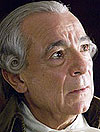Biography
He trained as an actor in the Institute of Dramatic Art in Westphalia (Bochum) and at the Jacques Lecoq School (Paris). He did his early professional work as actor and director in the main theatres of the Federal Republic of Germany. In 1971 he came back to Spain where he produced, directed and performed in productions such as “Report for an Academy”, by Kafka, “Gaspar”, by Peter Handke and “The Resistible Rise of Arturo Ui”, by Bertolt Brecht.
After his leading role in the film “Pascual Duarte”, by Ricardo Franco, for which he won the Best Actor award at the Cannes Film Festival (1976), he worked with directors such as Jaime de Armiñán (“Nunca es tarde”), Juan Sebastián Bollaín (“Las dos orillas”), Enrqiue Brassó (“In memoriam”), Jaime Camino (“Luces y sombras”), Jaime Chavarri (“Dedicatoria”), Manuel Gutiérrez Aragón (“Sonámbulos”), Eloy de la Iglesia (“La estanquera de Vallecas”), Joseph Losey (“Les routes du sud”), Pilar Miró (“Beltenebros”), Carlos Saura (“Los ojos vendados” and “El séptimo día”), Gonzalo Suárez (“Rowing with he Wind”), Mariano Barroso (“Hormigas en la boca”) and Milos Forman (“Goya’s Ghosts”) among others.
In 1978, after a period of studies in New York with Lee Strasberg, he took over the management of the Centro Dramático Nacional, along with Nuria Espert and Ramón Tamayo, and two years later that of the Teatro Español. In 1992, he directed “La vida es sueño” in the Théâtre de l’Odéon and the following year “Carmen” in the Opéra de la Bastille, both in Paris. Since then, he has concentrated on the conception, administration and management of the eatro de la Abadía, opened in 1995, where he has tackled a wide repertory, encouraged the training of actors and invited important European directors.
In 2008, he directed the opera “Simon Boccanegra”, by Verdi, in the Gran Teatre del Liceu. He has won numerous awards, the most notable of which include, as well as the above mentioned Best Actor award at the Cannes Film Festival, the National Theater award, Chevalier de l’Ordre des Arts et des Letters, granted by France, the Knight’s Cross of the Order of Merit of the Federal Republic of Germany, the Gold Medal from the Círculo de ellas Artes and the Gold Medal for Merit in Fine Arts from the Spanish Ministry of Culture.
Universal Pictures International
Actor
| Movies | |
|---|---|
| 2021 |
Official Competition |
| 2015 |
La isla del viento |
Truman |
|
| 2013 |
The Mute |
| 2011 |
The Skin I Live In |
| 2010 |
Anything You Want |
| 2009 |
Broken Embraces |
King Conqueror |
|
| 2008 |
La vida en rojo |
| 2007 |
Theresa: The Body of Christ |
| 2006 |
Goya's Ghosts |
The Good Voice |
|
| 2005 |
Ants in the Mouth |
| 2004 |
Atún y chocolate |
The Seventh Day |
|
| 2003 |
The End of a Mystery |
| 2000 |
Gitano |
| 1995 |
Flamenco |
| 1991 |
Prince of Shadows |
| 1988 |
Lights and Shadows |
Rowing in the Wind |
|
| 1987 |
La estanquera de Vallecas |
Las dos orillas |
|
| 1986 |
Dragón Rapide |
| 1984 |
El balcón abierto |
| 1980 |
Dedicated to... |
| 1978 |
Blindfolded Eyes |
Roads to the South |
|
Sleep Walkers |
|
| 1977 |
In memoriam |
Nunca es tarde |
|
Parranda |
|
| 1976 |
Pascual Duarte |
| Series | |
|---|---|
| 1999 |
The Road to Santiago |
| 1985 |
Los pazos de Ulloa |
| 1969 |
Kapitän Harmsen |
| 1968 |
Cuentos y leyendas |
| Documentaries | |
|---|---|
| 2008 |
Hécuba, un sueño de pasión |
| 2006 |
El productor |
| Theatrical recording | |
|---|---|
| 1970 |
Eröffnung des indischen Zeitalters |
| 1969 |
Der Rückfall |
Guest
| Shows | |
|---|---|
| 1998 |
Versión española |
| 1997 |
Corazón de... |
| 1987 |
I premios Goya |
| 1984 |
Cinema 3 |
| 1967 |
Apropos Film |
